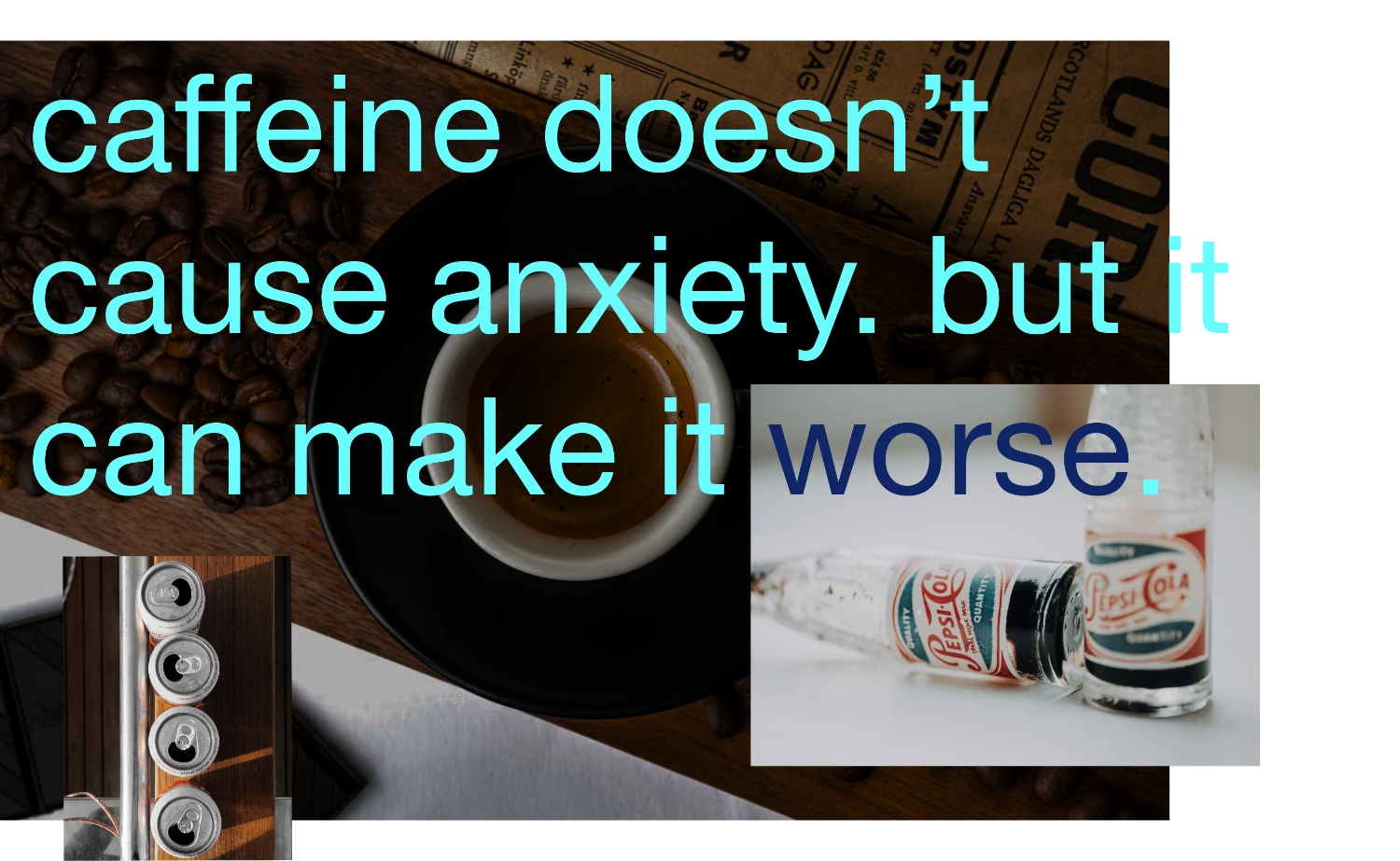let’s be honest: for a lot of us, caffeine is practically a love language. it’s how we start the day, power through the afternoon, or even celebrate a little “me time” with a frothy latte or a square of dark chocolate. it’s everywhere—at home, in the office, at the gym. and it’s hard to blame anyone. after all, caffeine is known for making us feel more alert, focused, and just a little more ready to deal with… everything.
but here’s the twist: if you’re someone who struggles with anxiety, caffeine might be quietly adding fuel to the fire.
what caffeine actually does to your body
so, what’s happening in your body after that first (or fourth) cup of coffee?
caffeine is a stimulant, and it works by blocking adenosine—a chemical in your brain that makes you feel tired. that blockage gives your nervous system the green light to perk up. on top of that, caffeine triggers the release of stress hormones like adrenaline and cortisol. yep, the same hormones that spike when you’re in a high-pressure meeting or stuck in traffic with your gas tank on empty.
this boost can make your heart beat faster, your breathing shallow, and your muscles a little more tense. sound familiar? these are also common signs of anxiety. which means caffeine doesn’t just wake you up—it mimics the exact symptoms your body feels when it’s on edge.
it’s not just the coffee, friend
most people associate caffeine with coffee—and fair enough, it’s a big one. but caffeine hides in all sorts of places. some of them might surprise you:
- soda (yep, even some root beers and orange sodas)
- energy drinks (which often contain more caffeine than coffee)
- pre-workout supplements (designed to hype you up, literally)
- black and green teas (they have less caffeine than coffee but still enough to impact)
- chocolate (especially dark varieties)
- over-the-counter meds like excedrin and some cold relief pills
so that innocent afternoon chocolate bar or sports drink might actually be pushing your anxiety levels up without you realizing it.
how caffeine and anxiety play off each other
let’s get something straight: caffeine doesn’t cause anxiety. but it can make it worse. it amps up your body’s fight-or-flight system—fine if you’re late for the train, not so fine when you’re trying to fall asleep or get through a tense conversation without spiraling.
people with anxiety disorders often have a more sensitive nervous system. so, even small amounts of caffeine can lead to feeling jittery, restless, or downright panicky. it can also disrupt your sleep, which is a huge deal. poor sleep makes anxiety worse, which can lead to more caffeine the next day… and round and round it goes.
everyone’s sensitivity looks a bit different
here’s the tricky part: not everyone reacts to caffeine the same way.
some people can throw back an espresso at 9 p.m. and sleep like a rock. others have half a cup of green tea in the morning and feel wired ‘til dinner. genetics, stress levels, medication, sleep quality—it all affects how caffeine hits you.
but if you’re someone who’s dealing with anxiety, it’s worth paying attention. keep a little mental note (or even jot it down) of how you feel after certain drinks or snacks. you might start noticing a pattern—and that’s the first step toward making some positive changes.
how to cut back without losing your mind
quitting caffeine cold turkey? for some, that’s a recipe for headaches, mood swings, and general crankiness. but there are gentler ways to make the shift:
- try half-caf: mix regular coffee with decaf to slowly reduce the dose
- switch to decaf or herbal teas: chamomile, peppermint, rooibos—they’re calming and naturally caffeine-free
- hydrate more: dehydration can make you feel sluggish, leading to that 3 p.m. caffeine fix
- snack smart: sometimes hunger or blood sugar dips get mistaken for fatigue
- give it time: your body will adjust. most people notice improvements in sleep and anxiety within a week or two
and remember—this isn’t about perfection. it’s about tuning in and giving yourself a better shot at feeling good.
a quick gut check before you sip again
caffeine isn’t evil. it’s not something you need to “quit” completely unless you want to. for many people, it brings joy, focus, or comfort—and that’s okay. but if you’re battling with anxiety, stress, or sleep issues, your caffeine habit might be tipping the scale in the wrong direction.
so maybe next time you reach for that 3 p.m. coke or double espresso, take a second and check in: “do i actually need this right now—or is this just habit?” you might be surprised at the answer.
sometimes, small tweaks—like cutting that second cup or switching to herbal tea—can lead to big shifts in how you feel, think, and sleep.
because your mental health? it’s worth that extra bit of awareness.

Leave a Reply